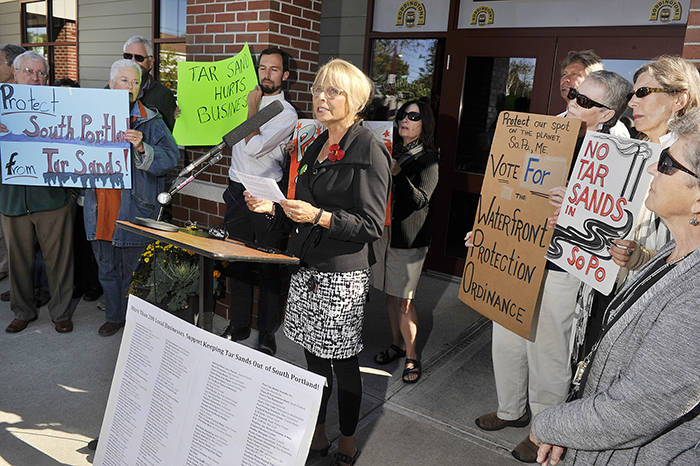Petroleum-handling companies and their allies in South Portland have donated tens of thousands of dollars to defeat the contentious Waterfront Protection Ordinance on the Nov. 5 ballot, raising nearly 10 times as much money as their opponents.
In the three-month period that ended Sept. 30, the Working Waterfront Coalition, which represents the Maine Energy Marketers Association, received $70,000 in cash donations from four corporate donors.
In the same period, the three organizations that are campaigning to pass the ordinance raised $7,302.82.
The imbalance is even more apparent for in-kind donations, the non-cash contributions of service or time by supporters of a committee’s cause.
Allies of the Working Waterfront Coalition gave about $205,000 of in-kind help, while the three groups advocating for the ordinance brought in $26,876.26 of the same type of assistance.
At issue is the proposal that South Portland residents petitioned to get on the ballot, to change the city’s zoning to prevent so-called tar sands oil from flowing through South Portland and being exported from its deep-water port.
The Working Waterfront Coalition says that if the law is enacted, it will spell the rapid demise of virtually all waterfront businesses that handle petroleum, in addition to some businesses that do not.
Tar sands refers to the raw, dense form of petroleum, technically known as bitumen, that is mixed with sand, clay and water in underground deposits. To process the substance into usable products, all of the non-petroleum elements must be removed after extraction.
The remaining bitumen at room temperature has the consistency of cold molasses, and must be heated or diluted with chemicals for it to flow through a pipeline. The bitumen must also undergo preliminary refinement before it is considered to be a form of crude oil.
Vast deposits of the substance have been known to lie under the Alberta wilderness since the 1930s. Alberta’s government says that proven reserves equal about 170.8 billion barrels of crude oil, most of which is locked up in oil sands. For years, the form of petroleum was too expensive to extract and process to be profitable.
For Portland Pipe Line Corp., which has seen decreased demand for its services, tar sands could be a lifeline.
The three ballot question committees that are promoting the ordinance are Protect South Portland, whose members proposed the law in May; the Natural Resources Council of Maine; and Save Bug Light, a group affiliated with Environment Maine.
Spending by the opposing groups differs greatly.
The three groups supporting the Waterfront Protection Ordinance have collectively spent $7,087.08, while the Working Waterfront Coalition has spent $25,883.36 on the campaign.
The fundraising and spending habits mirror predictions by both camps last month.
Protect South Portland’s proponents have, from the start, depended on volunteers from the community. Their tactics rely on personal interactions and vote-counting through canvasses. Teams of volunteers fan out across the city each weekend with clipboards and literature. Large fundraising figures were never part of the plan, organizers said.
The Working Waterfront Coalition, meanwhile, has hired professional political consultants, advertisers and marketing firms to plot strategy and reach out to voters. It plans automatic telephone calls and has sent direct mailers.
The campaign spent $15,000 on a study that explored the economic repercussions of a disappearance of petroleum companies from South Portland, which it said would lead to job losses and higher home-heating bills.
The study, by economist Charles Lawton, did not examine whether the proposed law would likely lead to the industry shutdown, only what would happen if it did.
In terms of individual cash donations, the two camps were far apart as of Sept. 30.
By far, the largest single contribution to Protect South Portland came from the husband and wife team of Roberta and Barry Zuckerman, who loaned the campaign $1,500, half of which has been repaid. The next largest single receipt was from Anna Lundquist of Pine Street in South Portland, for $242.45. Smaller, unitemized contributions accounted for $1,170.45 from an unknown number of donors.
The largest single donation to the Working Waterfront Coalition, $30,000, came from the Portland Pipe Line Corp., which operates the 236-mile underground pipe that has been used since the 1940s to ship crude oil from tankers docked in the Port of Portland to refineries in Montreal.
Spending by Protect South Portland, at $4,927.21 in the three-month period, went largely to rent, insure and stock its campaign office. Food for volunteers was another common expense. The organization had outspent its income by $288.25 at the end of September.
Key expenses for the Working Waterfront Coalition were for consultant work, including $4,000 to Burgess Advertising and Marketing of Portland; $4,466.88 to Dirigo Engagement Strategies LLC of Portland; $2,786.99 for printing mail; and a total of $7,000 for newspaper advertising, including $1,000 to MaineToday Media, which publishes the Portland Press Herald.
Matt Byrne can be contacted at 791-6303 or at:
Copy the Story LinkSend questions/comments to the editors.




Success. Please wait for the page to reload. If the page does not reload within 5 seconds, please refresh the page.
Enter your email and password to access comments.
Hi, to comment on stories you must . This profile is in addition to your subscription and website login.
Already have a commenting profile? .
Invalid username/password.
Please check your email to confirm and complete your registration.
Only subscribers are eligible to post comments. Please subscribe or login first for digital access. Here’s why.
Use the form below to reset your password. When you've submitted your account email, we will send an email with a reset code.